Voices: Insights from our PhD Students
Here you find insights from our PhD students about their research at the DKFZ and life in Heidelberg. Enjoy!
Srinidhi Desikan, India – Wilma-Moser prize 2019

Srinidhi Desikan completed her PhD under the supervision of Prof. Hannah Monyer in the Division of Clinical Neurobiology at the DKFZ. She received her PhD degree from Heidelberg University with highest distinction (summa cum laude) in October 2018. Srinidhi’s dissertation was awarded the 2019 Wilma-Moser Prize for the youngest female doctoral candidate with the highest grade in the natural sciences at the University of Heidelberg. Srinidhi is now working as a Scientist and Trial Manager at Charles River Laboratories in Groningen in the Netherlands.
"The journey throughout the three years of my PhD at DKFZ was exciting, motivating and required hard work and dedication. I am honored and humbled by the Wilma-Moser Prize. It’s a great initiative to encourage women in science and of course, it is wonderful to be acknowledged for my work and my efforts. I hope my PhD story stands out as an example to encourage more women to pursue scientific research careers with excellence."
Moritz Jakab, Germany – Research Program Cell and Tumor Biology

"Curiosity has always been one of my major drivers - science offers me a chance and a great platform to satisfy that need. My motivation to do cancer research is this combination of the intellectual challenge, room for creativity and exploration, as well as the clinical relevance of this topic, as cancer presents one of the leading causes for mortality world-wide.
I work in the Division of Vascular Oncology and Metastasis on the molecular and functional characterization of the (pre-)metastatic niche. The idea behind my research is to unravel novel mechanisms of metastatic dissemination that can be exploited pharmaceutically.
The DKFZ offers an amazing platform to do cancer research while being surrounded by bright minds that are truly inspiring; being part of the Graduate School community also makes it almost impossible not to get involved, not only in scientific but also social activities. I quickly discovered that at the DKFZ I can do excellent research in a welcoming environment."
Sara Mahmoud Hegy Ahmed, Egypt – Research Program Functional and Structural Genomics
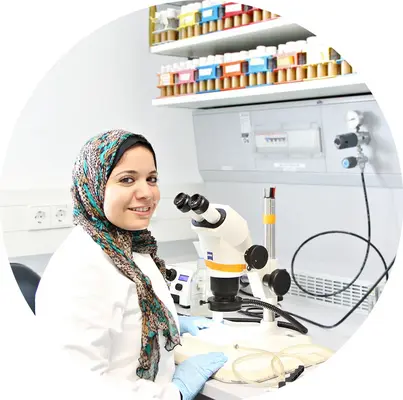
"My goal in science is to help shape the knowledge on how to treat cancer in hope to eventually contribute to improving the quality of patients’ lives.
I did my master studies in Germany to satisfy my curiosity and passion for science. I can’t remember being more delighted than when I received the acceptance letter from Heidelberg University and the DKFZ that I can join the master’s program “Major in Cancer Biology”. Later, I was able to join the International PhD Program at the DKFZ which offers me great opportunities to expand my knowledge.
As a doctoral student, I am working with stem cells to figure out which factors trigger them to divide. Using the fruit fly Drosophila Melanogaster as a model organism, I study how sex hormone signaling affects the regenerative capacity of intestinal stem cells under physiological conditions, during aging and in disease. Such knowledge will allow us to tailor treatments better to influence stem cell behavior during disease and control their tendency to divide beyond the organism’s needs, which can cause cancer."
Subhayan Chattopadhyay, India – Research Program Cancer Risk Factors and Prevention
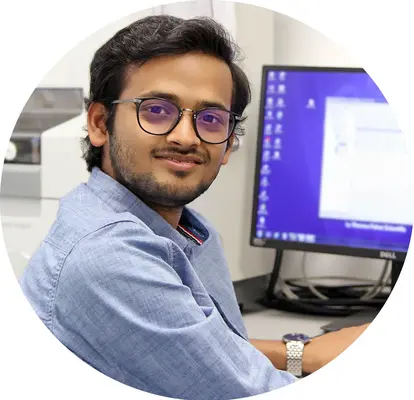
"What if all of it is a grand ensemble? Curiosity excites me and that let me choose a wider field of subjects to realize governing principles. I started with Mathematics, Statistics and Economics but at a certain point I was intrigued by mathematical equilibriums in nature which pushed me to investigate it in cancer biology. Cancer is a disease that knows no mercy; neither can we show it any mercy.
A problem can be solved best with knowledge gained from experience. The DKFZ is undoubtedly one of the prime players in Europe in the battle against cancer, with over five decades of experience. My research at the DKFZ binds the theoretical realm of mathematics to the practicality of systematic statistical analysis to explore inherent biological features of a condition. This development of an integrative process constructs the bigger picture and helps us to understand disease biology from a broader prospect."
Nina Weißhaar, Germany – Research Program Tumor Immunology
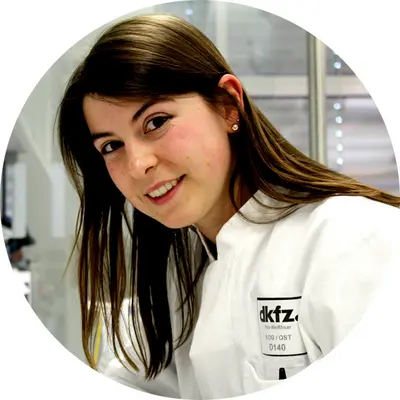
"Biological, chemical and physical cross talks happen everywhere around us, as well as in our bodies. These phenomena always fascinated me and the quest to understand them in depth led me to study “Technical Biology”. During this period, I became interested in pharmaceutical research and immunology and thus decided to continue my PhD at the DKFZ.
My research group works towards understanding why a cancer patient’s immune system fails to respond as it should, in order to overcome the disease. We investigate T cell exhaustion, a phenomenon during which T cells lose their protective functions and can no longer successfully defend the body. By interpreting underlying mechanisms, we can develop new ways to re-activate the immune system to fight against cancer cells. The long-term goal of my research is to identify potential new drug targets to improve antitumor immune therapy.
The DKFZ provides a well-connected working environment as it’s surrounded by the Faculties of Heidelberg University, the University Hospital Heidelberg as well as Biotech Startups."
Kai Dolde, Germany – Research Program Imaging and Radiooncology
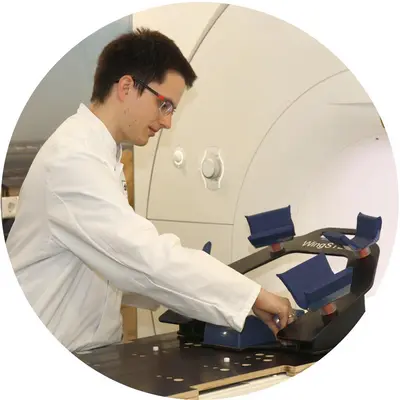
"I joined the DKFZ as I wanted to do my PhD in an application-oriented environment at an institute with excellent reputation. I am a physicist working in the department of Medical Physics in Radiation Oncology. My work is embedded in a very interdisciplinary environment with physicists, clinicians, technicians, computer scientists and includes contact to patients from the Heidelberg Ion-Beam Therapy Center (HIT).
In my PhD project I work on time-resolved magnetic resonance imaging (4D-MRI) and its application for radiotherapy. If patients have an abdominal tumor (in the liver, pancreas, etc.), respiration-induced tumor motion provides challenges for radiotherapy. Using 4D-MRI, we can obtain 3D movies of the tumor and its adjacent organs. We hope that with the resulting motion information we will be able to improve the treatment of these tumors.
It motivates me a lot to do research that may help society in future. I enjoy working at the DKFZ and experience a very cooperative working environment with many possibilities for networking and socializing among PhD students."
Britta Ismer, Germany – Research Program Translational Cancer Research
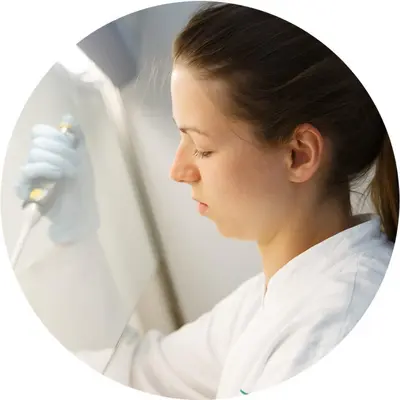
"I was still in school when I decided that I wanted to help people in my future career. So I decided to study Cancer Biology and Stem Cell Biology and got very motivated to do Cancer Research. I always knew that the DKFZ was THE place to come to when you are interested in this topic, so here I am!
I work at the Hopp Children's Tumor Center at the NCT Heidelberg (KiTZ). The goal of my PhD thesis is to identify candidate genes which drive tumor growth in pediatric brain tumors, develop respective models recapitulating the human disease and find a specific inhibitor for the treatment of these tumors. What motivates me to work in pediatric research is to help those children who suffer from this horrible disease. My research has a translational aspect, so we hope that our findings lead to a more specific therapy for pediatric patients with less side effects in future."
Further articles about our PhD students:
Gintvile Valinciute, Lithuania – A cancer researcher devoted to the youngest patients
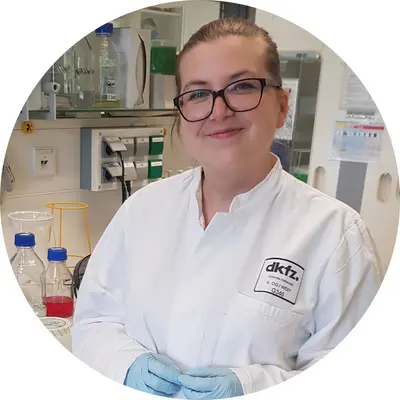
Gintvile Valinciute is a PhD student at the DKFZ and former student of the Master program of the DKFZ and the University of Heidelberg Major Cancer Biology. After graduating, she applied to the DKFZ PhD Program: "I also looked at other European PhD programmes, but the one here in Heidelberg enabled me to pursue exactly the research that interests me", she explains.
Gintvile attended the Nobel Laureate Meeting in Lindau 2018 (LiNo18). You can read the interview with her in the Research in Germany Newsletter in which she tells about her research at the DKFZ and her encounter with the Nobel Laureates.
She was furthermore interviewed for the Blog on "Women in Research at LiNo18".
Anne Rademacher, Germany – First Person
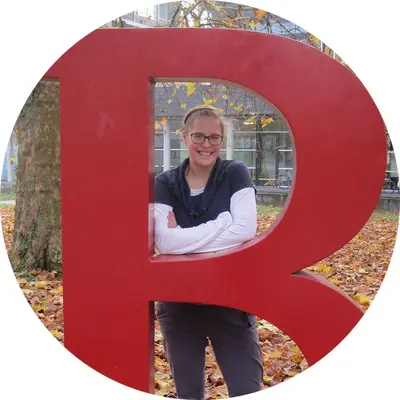
First Person is a series of interviews with the first authors of a selection of papers published in Journal of Cell Science.
Anne Rademacher is a PhD student in the laboratory of Karsten Rippe at the DKFZ and the Bioquant institute in Heidelberg, investigating the transcriptional silencing and activation of heterochromatin by using optogenetic tools and other microscopy methods.
She is the first author of 'Real-time observation of light-controlled transcription in living cells'. You can read her interview here and take a look at her paper:
Rademacher A, Erdel F, Trojanowski J, Schumacher S, Rippe K. Real-time observation of light-controlled transcription in living cells. J Cell Sci. 2017 Dec 15;130(24):4213-4224.